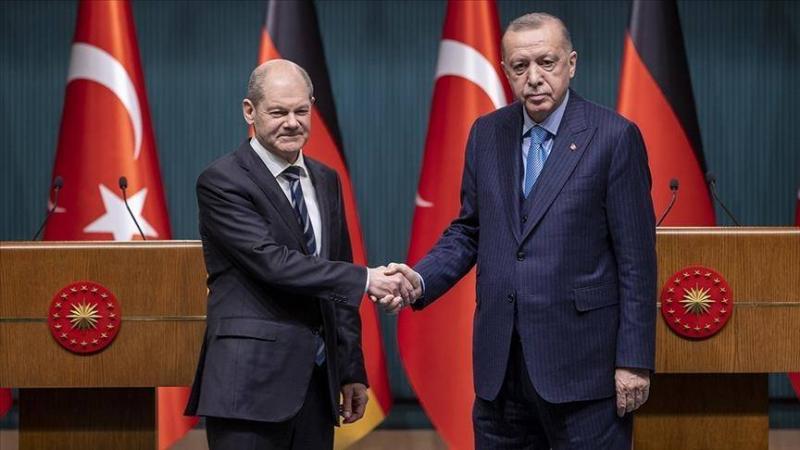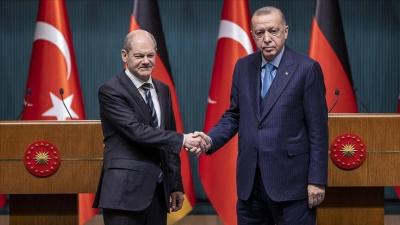The leaders of Germany and Turkey may hold differing views on the war between Israel and the Palestinian Islamic resistance movement, Hamas, as well as conflicting positions towards Moscow since its invasion of Ukraine. However, when they meet in Berlin today, Friday, both will have strong economic and electoral motivations to set aside their differences and engage in dialogue. This marks Turkish President Recep Tayyip Erdoğan's first visit to Germany since 2020, prior to municipal elections in which he hopes to win in Ankara and Istanbul. Improved access to European Union markets and visa liberalization could be significant gifts for voters struggling with high inflation and economic pressures.
Erdoğan will also need support from German Chancellor Olaf Scholz if he wishes to proceed with the purchase of 40 Eurofighter Typhoon fighter jets, which Turkey stated it desires yesterday. Germany is a partner in the consortium that builds these jets through Airbus. As for Scholz, who heads a tri-partite coalition divided over the German economy and the impact of rising migration on public services, Ankara's role in curbing migration to the EU makes it an indispensable partner.
In a sign of the visit's importance, Scholz made an effort not to directly comment on Erdoğan's unequivocal condemnation of the Israeli war against Hamas, which has resulted in the deaths of thousands of Palestinians. After Erdoğan described Hamas as a "liberation organization" on Wednesday, Scholz rejected several calls to criticize Erdoğan, referencing only in general terms that "the accusations against Israel are ludicrous." This response is certainly tempered, given the strong condemnation typically issued by Germany in response to far milder criticisms of Israel.
However, Erdoğan escalated his rhetoric on Wednesday, labeling Israel as a "terrorist state" that enjoys "unlimited support" from the West, implying that it may be impossible to sideline the Gaza-related disputes from the visit. Germany has expressed strong solidarity with Israel while urging a focus on reducing the war's impact on civilians in Gaza. Aydın Yasar, a specialist in Turkish affairs at the German Institute for International and Security Affairs, noted that planning for the visit began in the summer "when the outbreak of conflict in Gaza was not anticipated."
The visit also comes a day after the Turkish Parliament's Foreign Affairs Committee postponed voting on Sweden's NATO membership request, further delaying the expansion of the Western alliance after an 18-month wait during which Ankara demanded concessions from Stockholm regarding terrorism.
A 2016 agreement, under which the EU provides funds to Turkey to host refugees in exchange for a structured resettlement program, has significantly contributed to halting record flows of refugees to the EU. However, mutual accusations between Greece and Turkey place pressure on the bloc, and the increasing numbers of migrants exacerbate right-wing radicalism across Europe.
Erdoğan, who recently described Germany in a press statement as "the strongest country in Europe," may hope for Scholz's support in reviving stalled talks on updating the customs union between Turkey and the EU, though no significant changes are expected until long after the March elections.
Despite efforts from both sides, Gaza has already made its impact felt. Erdoğan's schedule was originally set to include an additional day in Germany, allowing him and Scholz to host a friendly football match between their countries tomorrow, Saturday. Considering the presence of approximately three million people of Turkish descent in Germany, such encounters are always seen as fraught with risks; this time, the assessment indicated that the risks are particularly high. Yasar stated, "There was fear of anti-Israel chants... it is unlikely that Scholz would want to witness that with him."




